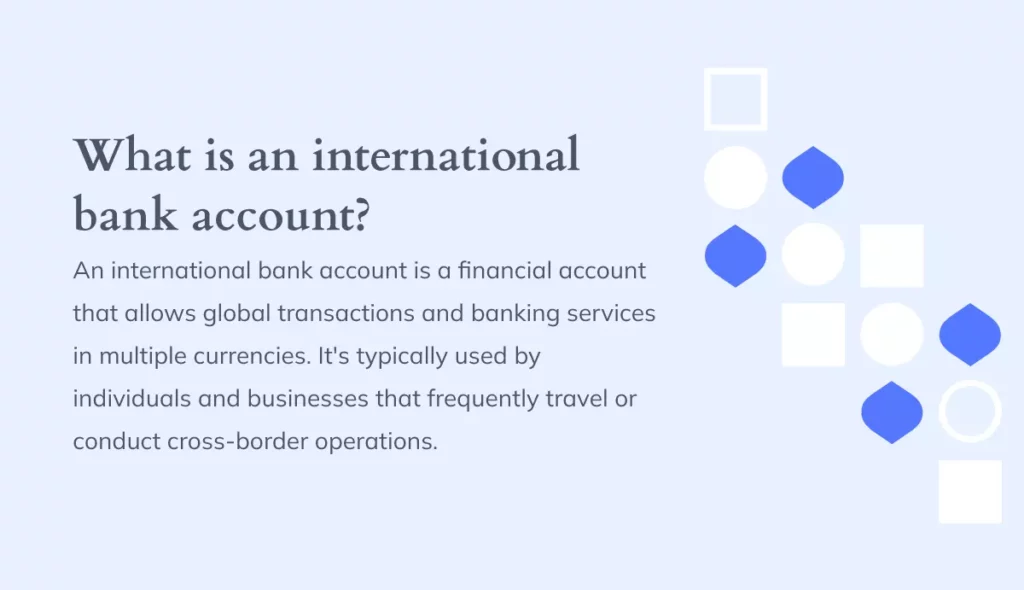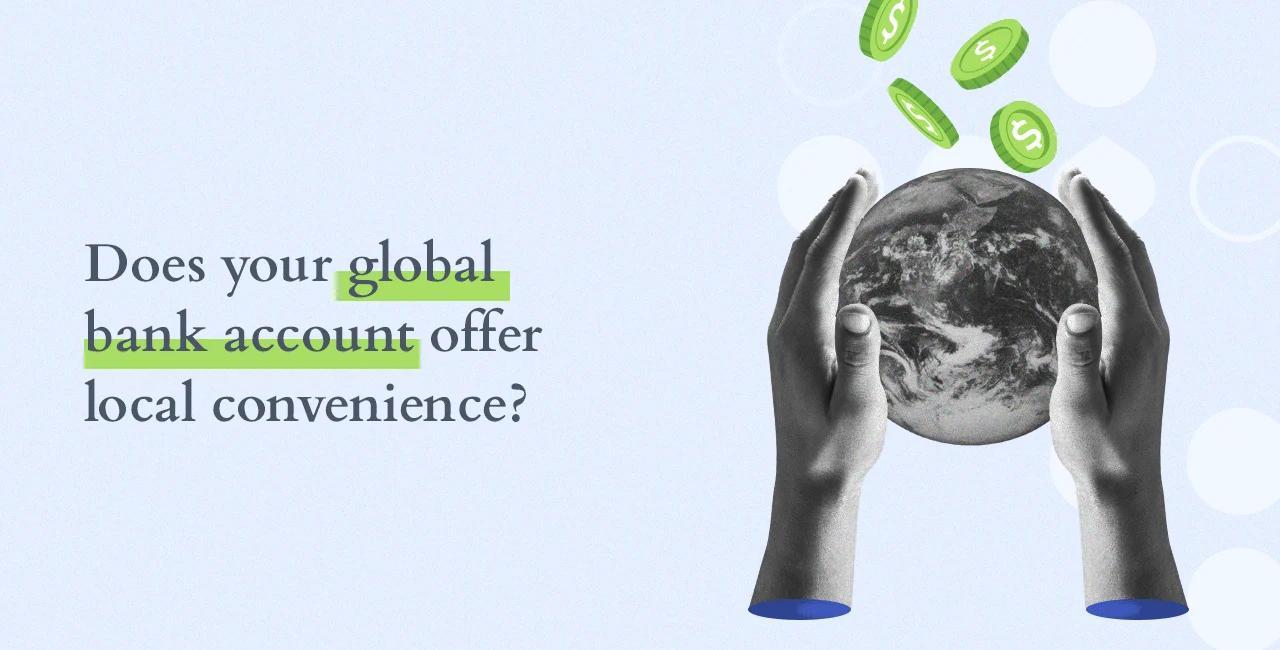Are you looking for a guide to opening an international bank account for a business? You are in the right place.
As global citizens, we live in an increasingly interconnected world. The need for international banking services, such as the ability to open an international bank account, is more critical than ever. But what exactly is an international or global bank account, and what advantages does it offer for businesses?
What is an International Bank Account?

An international or offshore bank account is a financial account you open with a financial institution in a foreign country.
Global banking allows your business to:
- Hold, receive, and disburse payments in multiple major currencies, unlike a domestic account.
- Streamline international transactions, potentially offering cost efficiencies.
- Use essential tools for day-to-day banking in different countries.
Deciphering the Need for an International Bank Account
An international bank account provides numerous advantages for businesses, including global companies, international freelancers, digital nomads, and overseas property owners.
It is particularly beneficial for enterprises and professionals who frequently engage in cross-border transactions or have financial interests in multiple countries.
Benefits of an International Bank Account for Businesses
An international bank account is more than just a financial tool; it can unlock numerous global business benefits. Here are six key reasons why opening such an account is advantageous:
1. Global Mobility
An international bank account, also known as a multi-currency bank account, provides seamless access to funds in multiple currencies for businesses with international operations. This flexibility is crucial for companies operating across borders, allowing them to manage finances efficiently and conduct transactions anywhere.

2. Facilitates International Transfers
International bank accounts streamline cross-border payments, reducing conversion costs and often offering better exchange rates for transfers between major currencies. This can result in significant savings for businesses that regularly transact globally, enhancing financial efficiency.
3. Business Efficiency
These accounts are designed to lower transaction costs and improve time efficiency, which is essential for businesses involved in international trade. They enable companies to efficiently transfer money internationally, manage cash flow, receive payments, and conduct multi-currency transactions.
4. Asset Protection
An international bank account offers a secure haven for business funds, governed by the laws of the country where the bank is located. This provides an extra layer of asset protection against domestic economic fluctuations or legal issues, safeguarding business assets.
5. Investment Diversification
Businesses can access attractive interest rates and investment opportunities in different countries. An international bank account allows companies to diversify their investments across various countries, currencies, and financial markets, mitigating potential financial risks and yielding better returns.
6. Multi-Currency Finance Management
Managing multiple currencies within a single platform is invaluable for companies operating in multiple countries. An international bank account offers this capability, making it easier to handle finances and access funds as needed, ensuring smooth operations across different markets.
Types of International Bank Accounts for Businesses
When navigating global banking, businesses typically encounter three primary types of accounts, each tailored to specific financial needs and operational strategies.
1. Checking Accounts
Designed for regular transactions, checking accounts allow businesses to deposit and withdraw funds, facilitating day-to-day banking activities.
Benefits:
- Immediate Access to Funds: Ensures liquidity for daily operational expenses.
- Transaction Flexibility: Accommodates frequent transactions, though some accounts may impose limits or fees after a certain number of transactions.
- Digital Banking Tools: Offers online banking and digital money management features for efficient financial oversight.
- Deposit Insurance: In jurisdictions like the U.S., deposits are insured by the FDIC up to specified limits, providing financial security.
2. Multi-Currency Accounts
These accounts enable businesses to hold, manage, and transfer funds in multiple currencies, streamlining international transactions and reducing the need for frequent currency conversions.
Benefits:
- Currency Diversification: Allows holding multiple currencies, facilitating seamless global operations.
- Cost Efficiency: Often provides better exchange rates and lower foreign transaction fees than standard accounts, especially when conducting wire transfers.
- Real-Time Payments: Supports prompt international transactions, enhancing cash flow management. Businesses can benefit from efficient wire transfers, ensuring timely fund availability across borders.
3. Savings Accounts
Savings accounts are intended for storing funds while earning interest over time, making them suitable for specific financial goals or reserves.
Benefits:
- Interest Earnings: Typically offer higher interest rates than checking accounts, aiding capital growth.
- Financial Security: Deposits are insured up to certain limits, ensuring the safety of funds.
- Digital Access: Provides online banking capabilities for monitoring and managing savings.

Online Banking and Fintech vs. Traditional Banking
The financial landscape has evolved with the rise of online banking and fintech solutions, offering businesses enhanced speed, affordability, and transaction transparency. These platforms provide real-time processing, lower fees, and user-friendly interfaces, streamlining financial operations.
Why Some Businesses Still Prefer Traditional Banks
Despite the rise of fintech solutions, many businesses favor traditional banks due to their established trust, comprehensive services, and personalized support. However, traditional banking presents challenges, particularly for businesses engaged in international operations.
Challenges of Traditional Banking
These include high fees for cross-border wire transfer transactions, opaque foreign exchange rates leading to unfavorable conversions, and the necessity of opening multiple local accounts to manage different currencies, which increases administrative burdens.
The Advantages of Online Multi-Currency Banking
Online multi-currency banking addresses these challenges by consolidating various currency accounts into a single platform, simplifying management, and reducing the need for multiple banking relationships.
This centralization enhances convenience and efficiency, providing 24/7 access and digital tools that facilitate seamless international transactions. By leveraging online multi-currency banking services, businesses can optimize their financial operations, reduce costs, and enhance global competitiveness.
Making the Right Choice: Selecting a Global Bank
When expanding internationally, choosing the right banking partner is critical for managing financial operations effectively. It’s important to assess the services offered, such as banking, payments, and invoicing, while also considering monthly and transaction fees and the ease of account setup. An ideal solution should provide streamlined operations, cost-efficiency, and global reach to support your business goals.
Bancoli’s Global Business Account (GBA) meets these needs by offering a comprehensive, all-in-one platform for businesses operating across borders. With its innovative approach, the GBA empowers businesses in over 200 countries to manage multi-currency transactions efficiently.
Key Benefits of Bancoli’s Global Business Account:
- Multi-Currency Management: Seamlessly hold and manage funds in 11 currencies, including USD, EUR, GBP, MXN, CAD, AUD, HKD, SGD, NZD, PLN, and CNY, reducing the complexity of managing multiple accounts.
- Global Transactions: Facilitate payouts in over 50 currencies across more than 200 countries with competitive fees and real interbank exchange rates, ensuring financial efficiency.
- Multi-Currency Invoicing Tool: Accelerate cash flow and simplify invoicing processes with a tool to streamline and optimize your business operations.
- Enhanced Security: Benefit from military-grade encryption, multi-factor authentication, fraud monitoring, and protection for funds up to $125 million, providing peace of mind for your global operations.

By integrating banking, payments, and invoicing into one platform, Bancoli’s Global Business Account eliminates the inefficiencies of traditional banking, allowing businesses to focus on growth and success in the global market.
Opening a Bancoli Global Business Account: A Step-by-Step Guide
Establishing an international bank account with Bancoli is a strategic move for Single-Member Limited Liability Companies (LLCs) and registered businesses aiming to expand their global footprint and implement multi-currency financial tools. By leveraging such an account, businesses can benefit from streamlined international transfers, reduced foreign transaction fees, and improved cash flow management.
Additionally, access to competitive exchange rates and the ability to hold funds in multiple currencies can significantly enhance financial efficiency. These advantages facilitate smoother global operations and provide robust fund diversification and asset protection platforms, ultimately supporting business growth and sustainability.
Application Process
Embarking on your global business journey with Bancoli is straightforward.
Follow these steps to establish your Global Business Account and unlock seamless international transactions.
- Sign Up and Email Verification:
- Visit Bancoli’s signup page and create an account.
- Verify your email address to access the Global Business Account dashboard.
- Business Verification:
- Within the dashboard, initiate the business verification process.
- Provide detailed information about your business and upload the required documents mentioned below.
- Application Review:
- Bancoli will review your application and the business documents you submitted.
- Upon approval, you’ll gain access to your multi-currency account.
Required Documentation
To successfully open an international bank account with Bancoli, you must prepare essential documentation that typically falls into four main categories. This requirement is consistent with most international banks and ensures compliance with global banking standards and regulations.

Proper preparation of these documents will streamline the verification process and expedite your account opening. You can conveniently apply online by submitting the following:
- Legal Formation Documents: These documents, such as certificates of incorporation or registration, are crucial for verifying your business’s legal establishment and legitimacy.
- Operational and Governance Documents: This category includes documents that outline your business’s internal operations, management structure, and governance policies and ensure compliance with relevant regulations.
- Proof of Physical Business Address: Documents like utility bills or bank statements are necessary to confirm your business’s physical location and establish its operational presence.
- Personal Identification Documents: Account holders are required to provide personal identification documents, such as a passport or national ID, to verify their identity and comply with international banking regulations.

Conclusion: Harnessing the Power of a Global Account
An international or global account is essential for seamless international transactions in today’s business world. Bancoli’s Global Business Account acts like a business financial passport, simplifying managing multiple currencies and reducing cross-currency transaction costs without needing separate domestic accounts across different countries.
Global banking enhances financial management by allowing multiple currencies within a single account, minimizing currency conversion complexities and foreign transaction fees. It also offers financial security and asset protection by diversifying funds across countries, safeguarding against domestic economic fluctuations.
Businesses benefit from the ability to transact in major currencies, supporting international trade and investment diversification with competitive transfer fees and exchange rates. A global account enables businesses to navigate international finance confidently and efficiently, whether managing finances abroad or expanding globally.





